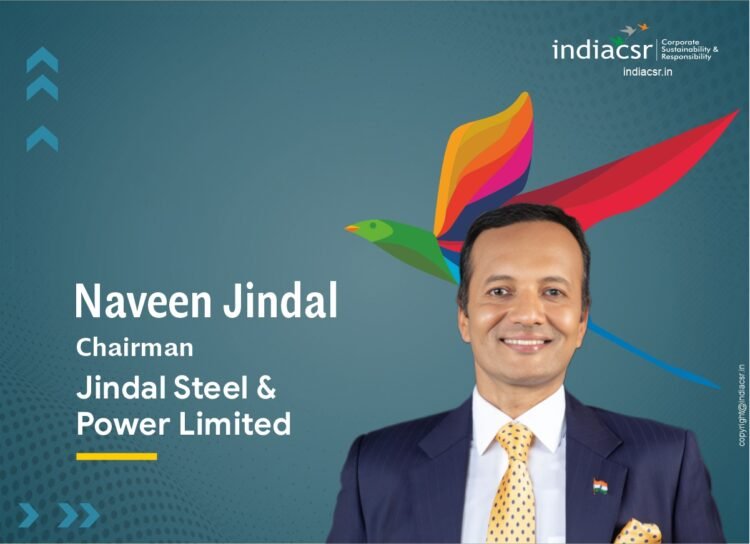MUMBAI (India CSR):In a significant demonstration of corporate responsibility, Jindal Steel Limited (formerly Jindal Steel & Power Limited) has reported a robust Corporate Social Responsibility (CSR) expenditure of ₹267.42 crore for the financial year 2024-25, exceeding its statutory obligation by over Rs. 100 crore. This marks a substantial increase from the previous year’s Rs. 227.64 crore, underscoring the company’s deepening commitment to sustainable community development amid India’s push toward a $5 trillion economy.
The expenditure, detailed in the company’s Integrated Annual Report released alongside the notice for its 46th Annual General Meeting (AGM) on August 30, 2025, aligns with Schedule VII of the Companies Act, 2013. Jindal Steel’s average net profit for the preceding three years stood at Rs. 8,351.62 crore, mandating a minimum 2% CSR spend of Rs. 167.03 crore. However, the company voluntarily invested an additional Rs. 100.39 crore, resulting in no unspent amounts and full compliance with regulatory requirements.
The impact reached 14.6 million lives across 3,800 villages in India, demonstrating the scale and inclusivity of the company’s outreach. By positioning CSR as integral to its business philosophy, Jindal Steel underscores its vision of “Nation First, People First,” ensuring holistic societal progress.
Impact: Touching 14.6 Million Lives Across 3,800+ Villages
The report highlights transformative outcomes, with Jindal Steel impacting 14.6 million lives across more than 3,800 villages to date. In FY 2024-25 alone, over 50 projects reached millions, focusing on aspirational districts in Odisha, Chhattisgarh, Jharkhand, Haryana, and Andhra Pradesh. For instance:
- Education efforts reduced dropout rates and improved learning outcomes for 47,235 students in 180 schools.
- Health programs addressed “No Death due to No Blood” by collecting over 24,000 units cumulatively.
- Livelihood initiatives created economic opportunities for tribal groups like the Birhor community and supported 100 women farmers in apiculture.
Smt. Savitri Jindal, Chairperson Emeritus, whose vision emphasizes uplifting lives with dignity and equality, continues to guide these efforts. “Wealth finds purpose when it uplifts lives, bringing dignity, equality, and opportunity to all,” she is quoted in the report, reflecting the legacy of Founder Chairman Shri O.P. Jindal.
The company also integrates sustainability metrics, reporting a low Lost Time Injury Frequency Rate (LTIFR) of 0.15 incidents per million hours and Scope 1 & 2 GHG emissions of 22.51 MTCO2e, while investing in green technologies like solar power and producer gas plants.
CSR Strategy and Governance
Jindal Steel’s CSR is guided by a well-structured policy framework rooted in the Companies Act, 2013 (Schedule VII). A governance system ensures accountability, transparency, and alignment with community needs. Projects are designed using participatory rural appraisal and socio-economic surveys, making them relevant and impactful. This ensures that CSR initiatives are not random acts of philanthropy but strategic, need-based interventions.
The Triple Bottom Line framework—People, Planet, Profit—balances economic growth with environmental responsibility and social well-being. This approach allows Jindal Steel to integrate CSR with its corporate ethos, ensuring long-term benefits for communities while meeting regulatory expectations.
Key Focus Areas: Health, Education, and Sustainable Livelihoods Lead the Way
Jindal Steel’s CSR initiatives, overseen by the Health, Safety, CSR, Sustainability, and Environment (HSCSE) Committee chaired by Independent Director Dr. Bhaskar Chatterjee, emphasize harmony between industry and communities. The policy prioritizes underprivileged groups through socio-economic, educational, and health programs, with a need-based approach informed by structured assessments and stakeholder consultations.
Health & Nutrition
Health and nutrition received significant attention, with Rs. 52.76 crore spent across Chhattisgarh, Jharkhand, Odisha, and Haryana. Key initiatives included Kishori Express (improving adolescent health), Jindal Arogyam hospitals, and support to the PM TB Mukt Bharat Abhiyan. These projects focused on preventive healthcare, treatment accessibility, and community wellness.
The approach combined mobile health services, awareness programmes, and healthcare infrastructure. Through these interventions, Jindal Steel addressed critical gaps in rural healthcare systems. The emphasis was on reducing malnutrition, tackling diseases, and strengthening medical access for vulnerable communities, reflecting a comprehensive approach to public health improvement.

Drinking Water & Sanitation
Jindal Steel allocated Rs. 3.95 crore for drinking water and sanitation projects in FY25. These initiatives spanned aspirational districts, focusing on access to safe drinking water, sanitation facilities, and hygiene awareness. Activities included setting up clean water sources, mobile water vans, and the installation of toilets.
By targeting both infrastructure and behaviour change, the company aimed to prevent water-borne diseases and improve hygiene practices. These projects aligned with national missions like Swachh Bharat Abhiyan. By addressing rural water scarcity and sanitation challenges, Jindal Steel helped strengthen basic health indicators in underserved areas.
Education and Skill Development
Education received the largest share of CSR spending, with Rs. 149.83 crore spent in FY25. This covered schools, universities (OPJGU, OPJU), and community education initiatives across multiple states. Focus areas included formal schooling, digital literacy, scholarships, and vocational training. The company also spent Rs. 2.97 crore on skill development programmes, collaborating with institutions like Lighthouse Communities Foundation.
These interventions created pathways for employability, especially for youth in aspirational districts. By combining education with skill training, Jindal Steel addressed both long-term academic growth and immediate livelihood opportunities, contributing significantly to human capital development.
Environment & Agriculture
A total of Rs. 4.78 crore was invested in environment and agriculture-related CSR initiatives. The focus was on afforestation drives, sustainable agriculture practices, water conservation, and biodiversity protection. Projects included tree plantation in mining belts, soil conservation, and the introduction of modern farming techniques to improve yields.
These initiatives were crucial in balancing industrial growth with ecological stewardship. By empowering farmers with better techniques and promoting eco-friendly practices, Jindal Steel ensured that rural communities not only benefited economically but also contributed to environmental preservation and climate resilience.
Sports, Culture, and Rural Development
Beyond core sectors, Jindal Steel invested in sports promotion, cultural preservation, and rural development projects. A striking example was the Rath Yatra 2024 in Odisha, where the company supported 1.4 million pilgrims with meals, ORS sachets, raincoats, toilets, and mobile water vans. These initiatives showed the company’s agility in addressing immediate community needs during large-scale events.
The emphasis on rural sports development helped nurture young talent, particularly in tribal areas. By blending cultural heritage with modern support systems, Jindal Steel strengthened community pride and inclusivity while addressing social welfare.
Implementation and Partnerships
CSR projects were implemented through collaborations with multiple agencies, ensuring professional execution and scalability. Registered partners included Jindal Foundation, Om Prakash Jindal Gramin Jan Kalyan Sansthan, LEPRA Society, LV Prasad Eye Institute, and the Army Wives Welfare Association, among others.
This partnership model enabled resource pooling, transparency, and greater grassroots outreach. The collaboration with specialised agencies also ensured technical expertise in health, education, and livelihood projects. This multi-partner framework strengthened accountability while expanding the scope of impact, making CSR interventions both sustainable and efficient.
(India CSR)







